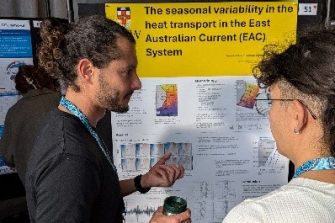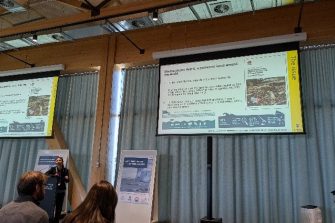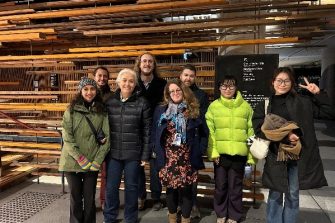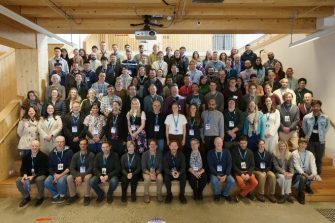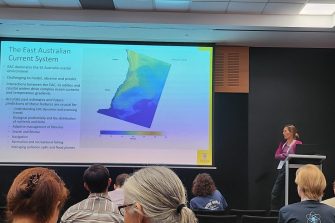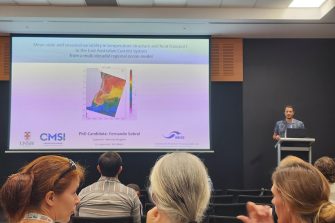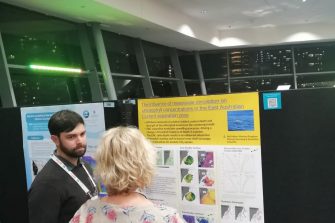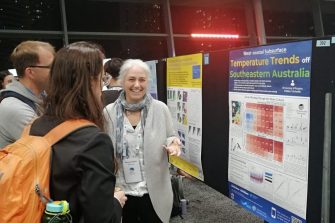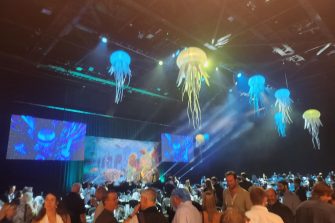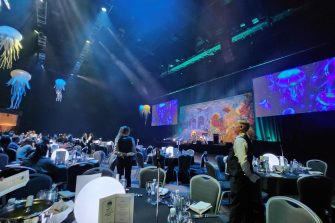Media coverage and news
-
Professor Moninya Roughan discusses FVON program in the Pacific
December 2025
UNSW recieves $35m to establish Centre of Excellence for Our Future Oceans
December 2025
The Centre of Excellence for Our Future Oceans has received $35 million from the Australian Research Council to investigate and manage rapidly changing ocean systems.
The new national research centre will bring together Australia’s leading ocean science and engineering communities to harness new and emerging technologies that address these challenges. The Centre will comprehensively determine how oceans are changing, now and in the future, and develop solutions to promote ocean sustainability and a thriving blue economy.
Read more details about the latest ARC Centres of Excellence here
Byron Bay shark frenzy sparked by unusual ocean conditions
December 2025
Extraordinary numbers of large sharks have been feasting on bait balls along Tallow Beach in Byron Bay since Friday morning (5/12/2025). Long-time locals and devoted surfers of the area have never seen anything like it. “I saw more sharks that morning than I have in my lifetime of surfing”, said local surfer and surfboard manufacturer Conor Duffy, who has been a regular in Byron Bay “line-ups” for over 30 years. Incredible drone footage showed sharks and dolphins feeding together, herding the bait balls into the northern corner of the beach. The typically crowded surf at Tallows beach was empty as tourists and locals alike watched the natural spectacle from the shore.
But what was unique about the oceanic conditions? Byron Bay local surfer, beachgoer, and expert oceanographer Colette Kerry weighs in. Colette leads the ocean prediction team in the University of New South Wales Coastal and Regional Oceanography group. “Anyone who regularly goes in the water in Byron Bay, or anywhere along the NSW coastline, knows that water temperatures can change quite a bit, not just over the seasons, but from day to day,” she says. The two main factors are the East Australian Current (the EAC, made famous in Finding Nemo) and coastal wind-driven upwelling.
Spectacular drone images captured by @marcsbaywatch on 7-8 Dec.What was different about early Dec. 2025 in northern NSW?
We had a strong and anomalously warm East Australian Current that was close to shore (up on the continental shelf), and we had strong coastal upwelling. This mixture of very warm clear water (the EAC) and nutrient-rich upwelled water is the perfect nursery for baitfish.
We have had ocean conditions like this before, often associated with increased fish activity close to shore, but never before with this magnitude of baitfish and never with so many large predators. Local surfer and fisherman Geoff Vascin, who doesn’t go a day without being in or on Tallow Beach (at Suffolk Park) and regularly fishes offshore says “These feedings patterns are more common at sea than close in… (It was) spectacular to see it in clear water and in the shallows”.
How different were ocean conditions to “normal”? Varying ocean temperatures are the norm off NSW as the winds are variable and the EAC is always swirling and changing. We see this from maps of Sea Surface Temperature (SST), that has been measured from space since the 1960s, revolutionising weather and ocean forecasting. With decades of satellite data, we have a good idea of the ‘average’ temperatures off northern NSW for this time of year. The extreme bait ball and shark activity off Byron Bay happened when the EAC was 2-3oC warmer than average, exceeding the 90th percentile. Yet close to shore, the temperature was cooler than average. The wave buoy off Ballina and a fishing vessel (part of the emerging Fishing Vessels as Ships of Opportunity Program) measured 20-22oC water close to shore, with the EAC just a few kilometres offshore measuring 27-28oC.
This stark temperature front brings warmth, light and nutrients together enhancing productivity (phytoplankton and zooplankton growth) and concentrating prey and predators.
The East Australian Current is an oceanic Western Boundary Current; these currents flow along the western boundaries of the ocean basins and redistribute warm water from the tropics towards the poles, regulating global climate. The winds over the tropics and subtropics are predominantly from the east so warm tropical water is pushed up against the eastern sides of continents, and this water ‘escapes’ in a strong jet that flows from the equator towards the poles. In the South Pacific Ocean, warm tropical water flows from north to south along the east coast of Australia. You can think of it like a hose; sometimes the water flows straight down the coast like a jet, sometimes it gets stronger and wiggles (“meanders”), and sometimes it becomes unstable and turns away from the coast, pinching off large spinning bodies of water. These oceanic eddies are the “weather systems” of the ocean. When the EAC moves away from the coast, cold water comes up from depth or from the south, and beachgoers notice cooler water.
Coastal wind-driven upwelling Most NSW beachgoers know that the water gets cold when the northerly wind blows and, while upwelling is a common phenomenon, it is poorly understood by many. People often ask, “Why is the water so cold in Summer?” and “Why doesn’t the north wind blow warmer water down from the north?” Well, if the world wasn’t spinning, wind blowing from north to south would push the surface waters from north to south. But because the earth is spinning, northerly winds push the surface waters towards the east (to the left of the wind in the Southern hemisphere, the opposite in the Northern hemisphere). So, along the NSW coastline, winds from the north, most common in Spring and Summer, push surface waters offshore. Colder water comes up from depth to fill the void. Water from depth is not only colder but also richer in nutrients, so upwelled water is sometimes greener and murkier.
Images of bait balls “swirling like weather systems or ocean eddies”, from below off the rocks at Tallows, and frenzying when driven into shallow water. Images by Colette Kerry.Satellite-measured Sea Surface Temperature (SST) showing the warm EAC and colder coastal waters off northern NSW (left), the SST anomaly (difference from the average, middle) and the SST percentiles (right). Curtesy of IMOS Ocean Current, https://oceancurrent.aodn.org.au/product.phpLocal surfers, young and old, are itching to get back in the waves. UNSW’s South-East Australia Forecast System (SEA-COFS) predicts the strong EAC to continue over the next week, although as of Tuesday morning (9/12/2025) the bait balls have already begun to clear. The SEA-COFS system brings the Global Mercator Ocean Model into the NSW region to capture processes on the continental shelf and close to shore.
Will we see more of these events? UNSW Coastal and Regional Oceanography group use maths (hydrodynamics), powerful computers and lots of ocean measurements to study how the East Australian Current behaves and how it is changing. Because we can’t measure the whole ocean, we use computers to solve complex maths equations to best estimate how the water moves, heats and cools. And because the ocean is a swirling, chaotic “mess”, we cannot trust maths alone. To constantly rectify our estimates, we bring in data from satellites that measure ocean surface temperature and surface height (the ocean surface has highs and low like weather systems that drive ocean currents), measurements from profiling floats, moorings, autonomous ocean gliders, and more recently sensors on fishing equipment. Our research shows that over the last 30 years, the EAC is shifting poleward. This means warmer water is penetrating further south, more often. Waters off Southern NSW and Tasmania are warming at 2-3 times the global average. Off Northern NSW, this shift could possibly mean more warm temperature extremes in the EAC. “Sharks are always on the surfer’s mind, but it seems that lately physical interaction has become a lot more common” says dedicated local frother Charly Wrencher.
Overall, it was an incredible spectacle of nature. Let’s hope the predators are well fed and we can all get back in the ocean soon!
A fishing vessel near Byron Bay measures coastal water temperatures of 20-21oC, about 2 oC below average. Image curtesy of IMOS, https://oceancurrent.aodn.org.au/fishsoop/NNSW/2025/20251204.htmlArticle by Dr. Colette Kerry
Lecturer, Coastal and Regional Oceanography Group
School of Mathematics and Statistics
Faculty of Science, UNSW Sydney
ABC article on FishSOOP programme
November 2025
ABC has just published an article on IMOS FishSOOP's work to gather ocean data in remote areas by partnering with commercial fishers and others. The article describes the 'transformational' potential of these sub-surface ocean observations for fisheries, climate science, and weather forecasting. You can read the full article here.
UNSW Powered 100+ Innovations & Capabilities
October 2025
FishSOOP recently featured in a UNSW publication showcasing "100+ Innovations & Capabilities that will change the world". The article describes how a lack of suitable sub-surface ocean data impinges on decision making by fishers, coastal communities, and decision makers. It then highlights the solution brought by the Indo Pacific Fishing Vessel Observing Network: crowd sourcing ocean data in partnership with commercial fishers. Also featured in the booklet was work on understanding marine heatwaves by our colleague A/Prof. Alex Sen Gupta.
Professor Atilla Brungs, Vice-Chancellor and President of UNSW Sydney, describes this booklet as, "a snapshot of the extraordinary work emerging from UNSW’s world-class research ecosystem." He also emphasises how these ideas are, "tackling the world’s most pressing challenges in ways that people and communities can benefit, in Australia and across the world [with the aim of making] a future that is fairer, more sustainable and prosperous for all."You can access the full document here. The articles discussed above are on pages 60 (Smart Fishing) and 55 (Peeking below Marine Heatwaves).
UNSW "Teaching the Reef" expedition to Heron Island
October 2025
Marina do Valle Chagas Azaneu PhD joined other leading marine scientists from UNSW on a teaching trip to Heron Island on the Great Barrier Reef. Attending students had the opportunity to learn first hand about the beauties and wonders of the reef, the threats it faces through climate change, and how we as humanity can make a difference.
FishSOOP Data Uptake - Western Rock Lobster 'FishOps' App
October 2025
Data from the IMOS FishSOOP programme are now being used alongside WRL's FishOps app. Some key extracts from the FRDC article are below or you can read the full version here.
- The app is a "one-stop-shop digital hub designed to make life easier for fishers and improve the quality of industry data."
- "The app integrates GPS tracking of pot drops and retrievals, catch records tied to specific locations, and the ability to generate a clear record of every trip. Over time, these features will help fishers build up a powerful dataset to guide their operations, a digital version of the knowledge traditionally passed down between generations."
- "Combined with trip and catch records, this environmental information [collected by IMOS FishSOOP] will provide insights for researchers and managers to see how lobsters might be responding to changing ocean conditions, critical knowledge as climate change continues to reshape marine ecosystems."
Professor Moninya Roughan delivers keynote address at TropEcS Symposium, Germany
September 2025
Moninya Roughan travelled to Bremen, Germany to deliver the keynote address on "Measuring, Monitoring, and Modelling the East Australian Current System: Closing Observational Gaps and Reducing Uncertainty at the Coastal–Shelf–Bluewater Interface" at the TropEcS Symposium hosted by the LEIBNIZ Centre for Tropical Marine Rsearch.
IMOS FishSOOP endorsed as a 'mature practice'
August 2025
The International Ocean Best Practice Organisation has officially endorsed the "IMOS Fishing Vessels as Ships of Opportunity (FishSOOP), Real-time Quality Assurance and Quality Control Practice Manual, Version 1.0 " as a Mature Practice.This is a very important step toward endorsement as a mature GOOS network and IMOS should be congratulated for their impressive effort. Building on their vast experience in sustained Ocean Observing, the FISHSOOP team achieved endorsement as a 'Mature practice' in just 2.5 years of operation.The practice document outlines everything Fish SOOP data users and network operators need to know to ensure rigorous sustained high quality data collection and data quality control (including quality control flags). And it is an important step towards international capacity building.
Professor Moninya Roughan joins the UNSW delegation to the annual PIURN Conference in Papua New Guinea
July 2025
Moninya Roughan travelled to Lae, Papua New Guinnea as part of the UNSW delegation to the the sixth annual Pacific Islands Universities Research Network (PIURN) Conference, hosted by the Papua New Guinea University of Technology (PNGUoT).
The conference theme was ‘Harnessing technologies for the safe and sustainable development of the Pacific." Moninya Roughan contributed to the Road to COP31 plenary session establishing the basis for joint action to support Pacific engagement in the lead-up to COP31.
PNGUoT also celebrated recent accreditation by Engineers Australia.
You can read more here.
Collaboration between IMOS FishSOOP and Pacific Community highlighted in FVON video
June 2025
The collaboration between IMOS FishSOOP and the Pacific Community (SPC) was featured in a recent post by the international Fishing Vessel Ocean Observing Network (FVON). The video highlights the importance of working with fishers to understand our changing oceans. Vessels are already collecting data in PNG, the Solomon Islands, and Fiji, with plans for 50 tuna vessels to gather data across the Western & Central Pacific. The collaboration is part of SPC's 'Pacific Islands - Fishing Vessel Observation Network' (PI-FVON). Our thanks go to the Environmental Defense Fund (EDF) for producing the video."
SPC Fisheries Newsletter April 2025 - spotlight on IMOS FishSOOP
June 2025
The partnership between the Pacific Community (SPC) and IMOS FishSOOP has been highlighted in SPC's latest fisheries newsletter. The article notes the importance and potential impacts of understanding sub-surface ocean temperatures, from fisheries management to climate change and severe weather prediction, all of which are highly relevant to the Pacific. It also describes how FishSOOP and other Ships of Opportunity observing programmes help to address the 'paucity' of available environmental data, by complement existing infrastructure in the Pacific. FishSOOP is collaborating on a project to instrument 50 tuna vessels across the Western and Central Pacific.
Read the full article here and the entire edition of the newsletter here.
Prof. Moninya Roughan and Stella Caon of IMOS FishSOOP/UNSW discuss installation and data gathering with tuna fishers in Fiji. (Credit: M Roughan and SPC)
Fishers in Papua New Guinea attach a FishSOOP Moana sensor onto their fishing gear. (Credit: SPC)
UNSW Oceanography team attends 2025 NSW IMOS Node meeting
May 2025
The UNSW Oceanography team was well represented at the 2025 NSW IMOS Node meeting held at SIMS on Wednesday May 28. Academics from the UNSW Oceanography Laboratory delivered three presentations on IMOS initiatives in New South Wales. Prof. Moninya Roughan gave a virtual talk on the FishSOOP programme, while Dr. Cuong Tran discussed his research using the HF coastal radar stations, and Dr. Robert Mason outlined his role in the NSW Government’s Ocean Outlook Aim to enhance coastal observations and oceanographic models.
Dr Linda Armbrecht awarded the Dorothy Hill medal
April 2025
Congratulations to Moninya Roughan’s former PhD student Dr Linda Armbrecht (co-supervised with the late Prof Leanne Armand) who has been awarded the Dorothy Hill medal from the Australian academy of science.
You can read more here.
UNSW Research Maps Marine Plastic Pollution Sources Along NSW Coast
March 2025
A collaboration between Tangaroa Blue Foundation and researchers at UNSW's School of Biological, Earth and Environmental Sciences and Centre for Sustainable Development Reform has revealed that most plastic pollution on NSW beaches comes from nearby sources.
You can read the article here.
Exploring the impacts of climate change on the Temperate East Marine Parks Network
March 2025
A group of researchers from the Institute for Marine and Antarctic Science, UNSW Sydney Oceanography team, and NSW Department of Climate Change, Energy, the Environment, and Water travelled to Coffs Harbour, Gumbaynggirr country as part of a project to explore the impacts of climate change and marine heatwaves on the Temperate East Marine Parks Network. The research team met with the Ngiyambandigay Wajaarr Aboriginal Corporation who are partners on the project. Gumbaynggirr Rangers Sidneigh, Greg and Anthony will be helping collect ocean temperature profiles using the Moana Sensors for the early detection and monitoring of marine heatwaves in the Solitary Island Marine Park in collaboration with the IMOS FishSOOP program.
Professor Moninya Roughan discusses Australia's ocean surface temperature, hottest on record in 2024
February 2025
Professor Moninya Roughan wrote an article for The Conversation and appeared on Sky News to discuss Australia's alarming record ocean surface temperatures for 2024.
You can read the article here.
FishSOOP comes to Papua New Guinea
January 2025
Fish SOOP had a successful trip to Papua New Guinea, where they installed Moana Sensors and deck units on 5 purse seine Tuna vessels. The vessels are from 4 /7 fishing companies that operate in PNG waters, owned by Philippino fishing companies.
The work was led by the Pacific Community (SPC) in collaboration with IMOS and UNSW. There was deep engagement from the National Fisheries Administration and the Fishing Industry Association of PNG who both supported the work financially and logistically. Additionally Zebratech provided excellent technical support in working through wifi issues, and are they making improvements to their deck units as a result of feedback.
-
Professor Moninya Roughan is elected a Fellow of the Australian Meteorological and Oceanographic Society
December 2024
Fellowship of AMOS is an honour that recognises longstanding members of the society who have made major contributions to the AMOS disciplines over a number of years. New Fellows must be elected by the current Fellows and approved by the AMOS Executive. Being elected a Fellow demonstrates the high esteem with which you are seen by the most senior and distinguished members of our community.
Sustainable ocean futures hooked on data
November 2024
This month, the FishSOOP project was highlighted in a UNSW science article. FishSOOP is a project that attaches sensors to fishing vessel gear to measure temperature. The project is led by Prof. Moninya Roughan and a small team including lab members Dr. Veronique Lago and project officer Matt Irwin.
You can read the article here.
Photo: Fishwell Consulting
IMOS FishSOOP workshop, Hobart
November 2024
The IMOS FishSOOP team met in Hobart for a workshop to discuss the running and potential expansion of the project. They were joined online by Josh Fielding of the Fisheries Research and Development Corporation (FRDC). Throughout the day long workshop, the team discussed data impact in both fishing and wider areas, governance structure, and project funding.
International Fishing Vessel Observing Network meeting
October 2024, UNSW Sydney
The Oceanography Laboratory at UNSW Sydney hosted the international Fishing Vessel Observing Network (FVON) meeting. Seventeen representatives from fishing vessel observing programmes in Japan, India, Sweden, Italy, Portugal, the USA , and Australia attended the 3-day meeting. The event consisted of workshops, discussions, and decision-making fora to determine the strategic direction and development of the network.
FVON brings together ocean observing programmes which use fishing vessels as ships of opportunity to collect ocean observations. Using sensors attached to the fishing gear, these programmes gather physical oceanography data to further our understanding of the oceans. UNSW runs one such programme - the FishSOOP project which is funded by Australia’s Integrated Marine Observing System (IMOS). This project collaborates with the fishing industry to attach low impact, cost effective sensors to fishing gear on vessels around Australia and beyond to gather temperature-depth data. These observations are anonymised and quality controlled, before being returned in near real time to the fisher who collected them and shared with meteorological services to improve weather forecasts. The data are subsequently made publicly available via the Australian Ocean Data Network (AODN) for wider use by scientific, government, and commercial stakeholders. The data have decision making applications across the blue economy including fisheries management, energy and resource extraction, and climate change mitigation.
Find out more about the IMOS FishSOOP project here. Find out more about IMOS here.
Norfolk Island Community Consultation
October 2024
Prof. Moninya Roughan and lab member Zac Anderson visited Norfolk Island as part of the Norfolk Island Marine Park Health Monitoring project team.
The project team, including Tracy Ainsworth (UNSW), Bill Legget and Troy Gaston (University of Newcastle) met with the local community at Norfolk Island. Moninya Roughan presented the UNSW Oceanography proposal to include temperature, salinity and wave monitoring in the marine park.
Currently Norfolk Island is a data deficient zone, particularly for ocean temperatures below the surface, limiting our long-term monitoring efforts. The proposed expanded monitoring would include:
- Deploying a long-term temperature sensor mooring which can detect ocean temperatures throughout the water column from seabed to ocean surface.
- Attaching spatial temperature loggers to existing Tiger shark beacons around the island, to provide ocean temperature readings from around the whole island near the seabed.
- Establishing a wave buoy to provide real-time information of the wave climate that can be accessed on the web
- Providing a number of small digital sensors for local fishers to attach to their vessels, for real-time data tracking of ocean temperature.
These monitoring programs will help fill current data gaps and give insight into the long-term ocean temperature change around the Island. This information will be crucial for understanding climate change impacts on the reef, and help to understand the long-term resilience of our reef systems.
Ocean Hackweek 2024
August 2024
Lab members Michael Hemming and Reg Dowse participated in Ocean Hackweek 2024 at the ANU Kioloa Coastal campus between August 25th and 30th.
Michael gave a tutorial on how to use and explore the Australian Multidecadal Ocean Time series products at the IMOS mooring sites. He also led the project MessageMeWhenItsHot to visualize ocean extremes via a web application.
Reg Dowse participated in a project to manage and process data from the Marimba platform in a way that could then be used for an existing AI-ML model.
Most of the time was spent writing code for the projects. However, there was also time for nature walks along the beautiful New South Wales coastline, sitting around the campfire, and singing karaoke.
Is the 2024 Paris Olympics Swimming Pool Making Swimmers Slower?
August 2024
Associate Prof. Shane Keating was interviewed by the ABC this month on the topic of whether a shallower swimming pool might have had an effect on the speed of swimmers during the 2024 Paris Olympics.
You can watch his ABC news interview and read an article about it in the Guardian.
CMSI Profile of the Month: Connor Henderson
August 2024
This month PhD candidate Connor Henderson was chosen as CMSI Profile of the Month. In the interview, Connor discussed his background, research interests, and experience in the lab, including his time chasing eddies onboard the RV Investigator.
2024 Ocean Modelling and Observations Workshop
July 2024
Prof. Moninya Roughan and lab members Michael Hemming, Gaby Mayorga Adame, Veronique Lago, Fernando Sobral, and Luke Mattisons attended the 2024 Ocean Modelling and Observations Workshop. This was a joint workshop of the Consortium for Ocean-Sea Ice Modelling in Australia (COSIMA) and Australian Coastal and Oceans Modelling & Observations (ACOMO), held in Canberra at the ANU campus from July 2nd to July 4th.
Presentations at the workshop included:
- Prof. Moninya Roughan:
- Oral Presentation: "The South East Australian Coastal Ocean Forecast System."
- Oral Presentation: "Towards new insights into ocean eddy structure by combining models and observations over a period of unprecedented data richness (Sept - Nov 2023)."
- Dr. Gaby Mayorga Adame:
- Oral Presentation: "Linking empirical data and oceanographic models to enhance marine plastic pollution management."
- Dr. Michael Hemming:
- Poster Presentation: "Monitoring coastal waters adjacent to the EAC using high-resolution ocean time series collected since 2006 (IMOS)."
- Dr. Veronique Lago:
- Poster Presentation: "FishSOOP: Fishing for near real-time ocean temperature data."
- Luke Mattisons:
- Poster Presentation: "Dispersion characteristics in the East Australian Current System."
- Fernando Sobral:
- Lightning Talk/Poster: "Seasonal variability in heat transport in the East Australian Current."
Fishing for Data: Measuring Ocean Temperatures Using Commercial Vessels
July 2024
This month, the FishSOOP project was highlighted in a UNSW newsroom article. FishSOOP is a project that attaches sensors to fishing vessel gear to measure temperature. The project is led by Prof. Moninya Roughan and a small team including lab members Dr. Veronique Lago and project officer Matt Irwin.
You can read the article here.
Photo: Fishwell Consulting
CMSI Profile of the Month: Gaby Mayorga Adame
July 2024
This month, lab member Dr. Gaby Mayorga Adame was chosen as CMSI Profile of the Month. In the interview, Gaby discussed her research interests and experience in the lab, including her time onboard the RV Investigator.
New Zenodo Community to Host Model and Observational Data Sets
July 2024
A new Zenodo community called 'South East Australia Physical Oceanography Datasets' (SEA-POD) was created to host model and observational data sets produced by the lab. At the time of writing, this community hosts high-resolution, multi-decadal, free-running EAC ROMS model output, tutorials for the AMDOT-EXT data products, and other code used by the lab.
You can access the SEA-POD community here.
The Gordon Research Conference on Ocean Mixing
June 2024
Lab member Dr. Marina Azaneu attended the Gordon Research Conference on Ocean Mixing this month near Boston, USA. Marina presented her work on characterizing ocean fronts within the East Australian Current (EAC) system. The conference provided plenty of opportunities to network with colleagues working on state-of-the-art ocean mixing science.
You can learn more about the conference here.
Welcome Matt and Sarah!
June 2024
The UNSW Coastal and Regional Oceanography Lab expanded in June to include new project officers Matt Irwin and Sarah Franklin.
Matt Irwin is a former naval officer from the UK with 13 years of experience at sea in navigation and operational planning roles. He holds an undergraduate degree in Biological Sciences and a master’s degree in Business Administration. His role is to manage and coordinate research projects, funding, and events on behalf of the team.
Sarah Franklin has worked for 17 years facilitating the use of expatriate remuneration data and managing comprehensive policy review projects for clients around Australia, New Zealand, and the Pacific Islands. Her role at UNSW is to manage and coordinate research projects on behalf of the Oceanography team.
Welcome to the lab!
Matt Irvin
Sarah Franklin
FDSE Summer School at École Polytechnique in Paris
May 2024
In late May, lab members Connor Henderson and Fernando Sobral attended the School of Fluid Dynamics for Sustainability and the Environment at École Polytechnique in Paris. Alongside 40 graduate students, Connor and Fernando engaged in a two-week program involving lectures, lab experiments, and numerical simulations guided by prominent fluid dynamicists in Europe.
Associate Professor Shane Keating Interviewed on ABC Science Show
May 2024
Associate Prof. Shane Keating was interviewed by Robyn Williams on ABC's Science Show. In the interview, he discussed how ocean currents can help cut shipping emissions. Shane is leading Ocean Intelligence, an innovative startup company that will implement a dynamic ship-routing algorithm to optimize travel time, fuel consumption, and emissions for the commercial shipping industry.
You can watch the interview here and learn more about Ocean Intelligence here.
AODN Hackathon
May 2024
Lab member Dr. Michael Hemming attended the AODN Hackathon last week (7-9th May) in Hobart. The hackathon was a great opportunity to learn how to access IMOS data in various ways using Python, how to load and plot cloud-optimised data sets, how to efficiently code using AI as a tool, and how to find, load, and visualise IMOS data sets using R. After the tutorials, attendees separated into groups to work together on various projects.
Michael presented a tutorial on how to load, plot, slice, and save extreme ocean temperatures contained in the Australian Multi Decadal Ocean Timeseries EXTreme (AMDOT-EXT) data products using Python and R. The tutorials and project code are available on the AODN IMOS-hackathon (Github repository).
Group photo of the hackathon attendees
Hackathon coders busy during project time
Moana Project Reflections Video
May 2024
The Moana project is wrapping up after 5 years of research, and a film has been made to reflect on the highlights of this nation-wide research project.
In the film (available here), Prof. Moninya Roughan shares her thoughts on what the Moana Project means to her.
Rare Freshwater Phenomenon off the NSW south coast
April 2024
NSW experienced the heaviest rainfall in 4 years during the first weekend of April. In parts of Sydney, more than 160 mm of rain fell. This excess rainwater made its way to the ocean, turning the normally turquoise blue coastal waters brown. The contrasting colours where the brown water from the river met the beautiful blue ocean water could be seen off the New South Wales south coast.
Prof. Moninya Roughan commented on this rare phenomenon for an ABC news article, and was interviewed on ABC South East NSW Breakfast.
The freshwater phenomenon off the NSW south coast. Photo taken by Terry Dixon, and included in the ABC article.
Prof. Moninya Roughan presents SEA-COFS at the CoastPredict General Assembly in Barcelona
April 2024
Prof. Moninya Roughan presents the South East Australian Coastal Ocean Forecast System (SEA-COFS) at the CoastPredict General Assembly in Barcelona. Our team's ocean forecasting effort led by Colette Kerry has been endorsed as a UN Ocean decade action.
SEA-COFS model output is available at Zenodo here.
Prof. Moninya Roughan presenting SEA-COFS (Photo credit Mitch Harley, UNSW)
Bluebottle Watch on ABC radio Illawarra
March 2024
Dr. Amandine Schaeffer spoke on ABC radio Illawarra this morning (20 March) to discuss the BluebottleWatch project. Dr. Schaeffer is leading the BlueBottleWatch project, along with Surf Life Saving Australia researcher Dr. Jaz Lawes.
The project aims to develop an online tool that will warn beachgoers about the likelihood of bluebottles invading the beach. This will hopefully reduce the number of stings treated by surf lifesavers, which presently is more than 40,000 around Australia every year.
Extreme Ocean Temperatures: Prof. Moninya Roughan interviewed on ABC
March 2024
The start of autumn has delivered extreme heat to NSW land and ocean. There has been a spell of abnormal heat lasting 10 days, with many inland regions exceeding 5C above average. Sydney's average maximum this month was 3.5C above the long-term average.
The waters off NSW are also extremely warm, with temperatures exceeding the 90th percentile: a threshold that is used to define marine heatwaves. Prof. Moninya Roughan was asked to comment on the abnormal ocean conditions for an ABC News and Guardian article, and was interviewed live on air by ABC news (see video below). Prof. Roughan also spoke live on ABC illawarra and ABC Darwin radio.
Recording of ABC News live stream on Youtube
Sea surface temperature anomalies and percentiles on 8 March 2024 (IMOS Oceancurrent)
Welcome Siyi!
March 2024
A warm welcome to Siyi Song! a new PhD student starting in the lab. Siyi will focus on the generation mechanism, seasonal changes, and interactions of the eddies in the East Australian Current region. Siyi graduated from the Ocean University of China with a bachelor's degree, and will be based at UNSW Sydney for the next 3+ years working with her supervisors Prof. Moninya Roughan and Dr. Junde Li.
Prof. Moninya Roughan receives the RSNSW Clarke Medal
March 2024
Prof. Moninya Roughan received the Royal Society of NSW Clarke Medal last week. The award was presented at Parliament House by her excellency the Honourable Margaret Beazley AC KC. and Dr Susan M Pond AM FRSN FTSE FAHMS, president of the Royal Society.
The award is made for distinguished research in any area of the sciences affecting the planet (excluding Medical, Veterinary, Agricultural and Environmental sciences) that is conducted in Australia and its territories.
The Clarke Medal is the oldest and most prestigious medal awarded by the Royal Society of NSW, which itself is the oldest learned society in the Southern Hemisphere. Moninya joins a stellar list of scientists including Richard Owen, Thomas Huxley, Fredrick Hutton, Douglas Mawson, and Emma Johnston.
Photos taken by Salty Dingo
Ocean Science Meeting in New Orleans
February 2024
Prof. Moninya Roughan and Dr. Veronique Lago presented their work at the AGU Ocean Science meeting in New Orleans this month. Nearly 6,000 scientists from around the world attended, which offered a great opportunity to catch up with colleagues. Moninya presented a poster on Ocean warming, trends and marine extremes, while Veronique presented her work with the FishSOOP project.
Following the Ocean Science meeting, Prof. Moninya Roughan and Dr. Veronique Lago met with international collaborators for a Fishing Vessel Observation Network (FVON) workshop. FVON has been officially endorsed by the UNESCO Ocean Decade as an action part of a global effort towards better knowledge of our oceans.
Left: Moninya's poster description, Right: Vero presenting FishSOOP
Transforming Ghana Fisheries with Moana Ocean Temperature Sensors
February 2024
A new video has been published highlighting the challenges faced by fisheries in Ghana due to declining catches. In this video, co-founder of Ocean Data Network, Carlos Castro Muniain, introduces the ZebraTech Moana temperature sensor (as used by FishSOOP) that provides near-realtime data on oceanographic conditions. These data are useful for empowering fishers with valuable insights for smarter and more sustainable fishing.
Associate Professor Shane Keating discusses waves on ABC podcast
February 2024
Associate Professor Shane Keating joined Suzanne Hill on the ABC Nightlife podcast to talk about waves and other mathematics. He answered questions on tsunamis, surf forecasts, and even managed to fit in a bit of card sorting mathematics.
You can listen to the podcast here.
Invitation to Contribute Articles to Oceanography Supplement: Western Boundary Theme
February 2024
In December 2024, The Oceanography Society is set to release the third supplement to Oceanography magazine, focusing on "Frontiers in Ocean Observing". The society is seeking initial interest in contributing short articles to this open-access supplement, and there is no cost to authors for publishing.
This supplement will comprise of articles that fall under various themes. Lab leader Prof. Moninya Roughan is a guest editor for theme 3: Western Boundary Currents and Their Impacts on Shelf Seas.
Letters of interest should be emailed to Oceanography Editor Ellen Kappel (ekappel@geo-prose.com ) by March 15, 2024, and should contain the following:
- A summary of the content of the proposed paper (no more than 200 words)
- Potential authorship and affiliations
- Identify which theme your article would fit under
- Contact information
Notice of whether you will be invited to contribute an article will be sent by April 15, 2024. More information about this supplement available here.
BluebottleWatch Fieldwork off Botany Bay
January 2024
BluebottleWatch French collaborators joined the Sydney team in January 2024 to test 3D-printed Bluebottle models that they designed in real ocean conditions. The fieldwork off Botany Bay was a great success, with the bluebottle models equipped with GPS and satellite communication systems being deployed and received over multiple days under varied weather and sea states.
The observations will now be analysed, with an aim to create a lagrangian model depicting Bluebottle movement (speed and direction) resulting from winds and currents. This model will then be integrated into ocean circulation models to understand the origin and variability of Bluebottles.
Invitation to Contribute Articles to Oceanography Supplement: Western Boundary Theme
February 2024
In December 2024, The Oceanography Society is set to release the third supplement to Oceanography magazine, focusing on "Frontiers in Ocean Observing". The society is seeking initial interest in contributing short articles to this open-access supplement, and there is no cost to authors for publishing.
This supplement will comprise of articles that fall under various themes. Lab leader Prof. Moninya Roughan is a guest editor for theme 3: Western Boundary Currents and Their Impacts on Shelf Seas.
Letters of interest should be emailed to Oceanography Editor Ellen Kappel (ekappel@geo-prose.com) by March 15, 2024, and should contain the following:
- A summary of the content of the proposed paper (no more than 200 words)
- Potential authorship and affiliations
- Identify which theme your article would fit under
- Contact information
Notice of whether you will be invited to contribute an article will be sent by April 15, 2024. More information about this supplement available here.
Deployment of Bluebottle-like models and classic ocean drifters equipped with GPS trackers (photo by Amandine)
Bluebottle Watch team (photo by Dan Hewitt)
Underwater gliders sample extreme low salinity (Conversation article and ABC News)
January 2024
New research led by Dr. Neil Malan and including contributions from lab members Prof. Moninya Roughan and Dr. Michael Hemming show that extreme rainfall in 2022 (the wettest year on record) led to freshwater plumes that extended further out from the coast than was previously thought possible. These plumes were 50 m deep, and remained offshore for months. A new 'double-stacking' dynamic was also observed resulting from the multiple rainfall events in 2022.
This research used data from 36 autonomous ocean glider missions over 13 years, and salinity observations at the Port Hacking 100 m depth mooring site. Such events may become more common as extreme rainfall events are projected to become more frequent as a consequence of climate change, hence continued observations are vital.
Dr Neil Malan and Prof. Moninya Roughan co-wrote a Conversation article on this work, and Neil also appeared on National ABC Breakfast.
Bottom-left: Plumes of floodwater pushed far out to sea during the 2022 floods. This image shows the Hunter River on April 11 2022. NASA Earth Observatory, CC BY-ND
-
Lab visit to WRL-UNSW facilites
December 2023
This week, a lab trip took place to visit the Water Research Lab - UNSW, located at the foot of Manly Dam. Professor Mitchell Harley kindly conducted a tour around the facilities of the oldest lab of its kind in Australia, with a history spanning more than 60 years.
For more details about what WRL does, you can visit the Water Research Laboratory website.
Different types of experiments are currently being conducted at WRL, with some of them in partnership with BEES
Prof. Moninya Roughan showcasing the lab's research at the UNSW DVC Research & Enterprise strategy day
November 2023
Lab leader Prof. Moninya Roughan presented the lab's research at the UNSW DVC Research & Enterprise strategy day last week (30th November). Moninya explained how ocean eddies drive extreme "ocean weather" off New South Wales, bringing in masses of warm water which sometimes persist for months.
Moninya also presented how data collected during the recent RV Investigator cruise will help in understanding how these eddies behave, and how the fishing industry is contributing data through citizen science approaches (FishSOOP).
Photographs taken by Jackie Randles at the UNSW DVC Research & Enterprise Strategy Day (LinkedIn)
Congratulations to Prof. Moninya Roughan on the award of the Clarke Medal and Lectureship in Earth Sciences from the Royal Society of NSW
November 2023
This award is made for distinguished research in any area of the sciences affecting the planet (excluding Medical, Veterinary, Agricultural and Environmental sciences) that is conducted in Australia and its territories.
The Clarke Medal is the oldest and most prestigious medal awarded by the Royal Society of NSW, which itself is the oldest learned society in the Southern Hemisphere. Moninya joins a stellar list of scientists including Richard Owen, Thomas Huxley, Fredrick Hutton, Douglas Mawson, and Emma Johnston.
For more details you can read more here.
Lab return while monster eddy is forming off Sydney
November 2023
Lab members onboard the RV Investigator returned home today (November 2nd) after 24 days at Sea. During this time essential data was collected for understanding eddies and currents off southeastern Australia. And to the lab's suprise the ship was welcomed back to Sydney by a Humpback whale!
As the lab members returned, a monster warm-core eddy was forming 50 km offshore threatening to raise ocean temperatures close to Sydney over the next days to weeks. Using ship data, and deployed drifters and Argo floats, they estimated that the 400 km wide eddy holds 30% more heat than normal for this part of the ocean, and determined that its currents are moving at 8km an hour and temperatures deep underwater are up to 3 degrees celsius above normal.
For more details you can read the conversation article written by Prof. Moninya Roughan, Dr. Amandine Schaeffer, Dr. Junde Li, and Associate Prof. Shane Keating, which was also picked up by the Guardian, Swellnet, Timeout, UNSW News Room, and Mirage News.
(top-left) Lab members departing the ship, (top-right) Humpback whale spotted close to the ship (photo credit: Dr. Vanessa Pirotta), (bottom-left) RV Investigator (photo credit: Dr. Vanessa Pirotta), (bottom-right) the monster eddy as seen by satellite on IMOS ocean current
Mid-voyage update
October 2023
Lab members onboard the RV Investigator have so far sampled two distinct eddies and crossed multiple fronts with an aim to understand how oceanic eddies are structured, how they interact with one another, how they interact with the shelf, and what happens in eddy fronts. They have been busy using the ship's Triaxus towed system and have undertaken multiple CTD profiles. Additionally, they have deployed drifters, radiosondes and Argo floats (including a biogeochemical one).
The voyage is a large interdisciplinary effort supported by several IMOS data streams. Read more here.
(Left) Getting ready to deploy the Biogeochemical Argo float from L-R Craig Hanstein, Pete Strutton and Moninya Roughan. Image Credit: Linda Gaskell, CSIRO MNF. (Right) Deploying the Biogeochemical Argo float. Image Credit: Bella Charlesworth (UNSW).
RV Investigator departs from Sydney
October 2023
Today (9th October) the RV Investigator departed from the White Bay cruise terminal to investigate eddies in waters off New South Wales. The ship's inhabitants, including many members of the lab, took in the sights of Sydney's skyline including the Harbour Bridge and Opera House.
Fair winds and following seas on your journey. May you have a safe and smooth voyage!
To follow cruise updates keep an eye out for the #RVInvestigator hashtag on X/Twitter.
Screenshots from the RV Investigator webcam
The RV Investigator departing sydney (photos taken by Stuart Milburn)
Full steam ahead for RV Investigator Eddy Mission
October 2023
This month lab members will board the RV Investigator to investigate the dynamics of eddies, their associated air-sea fluxes and impact on biological productivity, and to collect data useful for prediction.
Chief Scientist Prof. Moninya Roughan has been interviewed by the ABC, Sydney Morning Herald, and appeared on 7 News to speak on the importance of this cruise, while cruise investigator Prof. Shane Keating and Moninya have also written an article for The conversation.
The RV Investigator docked at White Bay Cruise Terminal a week ahead of departure. During this time members of the public were given the opportunity to take a peek inside the ship. UNSW science and other media groups also took part in a tour.
Welcome Cuong, Marina, Gaby and Xiaowen!
September 2023
And the UNSW Coastal and Regional Oceanography Lab is expanding! A brief introducion of our new members:
Cuong is a post-doc, with expertise on coastal ocean dynamics, using observations and modeling output to explain key processes driving changes in the ocean. Cuong earned his Ph.D. at the University of Littoral Cote d'Opale, where he investigated the dynamics of the Gulf of Tonkin and evaluated the effects of fine-scale processes on particulate material and phytoplankton distribution.
Post-doc Marina, is delving into the complexities of eddies and their interactions within the East Australian Current system. In the past, Marina's research included post-doctoral work at the University of East Anglia (UEA), where she studied air-sea interaction and extreme precipitation events in the eastern Indian Ocean, as well as completing her Ph.D. on the dynamics of Antarctic coastal currents.
The physical oceanographer Gaby, now with a post-doc position focusing on coastal ocean dynamics and bio-physical interactions, applies Lagrangian particle tracking models to study marine connectivity. In her previous role at the National Oceanography Centre (NOC) in Liverpool, UK, Gaby conducted research on various environmental issues, including plastics pollution and marine ecosystems resilience. She holds a Ph.D. in biological oceanography and an MSc in physical oceanography.
Xiaowen, currently pursuing her Ph.D. at the Coastal and Regional Oceanography program at UNSW, focuses on ocean data processing and the large-scale effects of ocean waves. Her work involves high-resolution processing of ocean wave model data and the utilization of non-stationary sea surface temperature data to predict wave patterns. Xiaowen's academic journey began at the Ocean University of China.
A warm welcome to our new lab members!
Cuong
Marina
Gaby
Xiaowen
UNSW Coastal and Regional Oceanography Lab launches SEA-COFS
September 2023
A suite of high resolution hydrodynamic ocean models for south eastern Australia that form the South East Australian Coastal Ocean Forecast System (SEA-COFS).
You access the dataset here and can also find it alongside other datasets on our Publications/Dataset webpage here.
Marine Heatwaves - The Conversation Article
September 2023
Amandine Schaeffer, Alex Sen Gupta, and Prof. Moninya Roughan's Article on MHWs in The Conversation received wide coverage, following publication of scientific research in the Nature Journal; Communications Earth & Environment.
Marine Heat Waves are prolonged periods of unusually high marine temperatures, and can occur in surface or sub-surface waters. They are a relatively recently studied phenomenom which look to be increasing in frequency and intensity as a result of climate change. The commonly used definition is that of Hobday et al 2015: A hierarchical approach to defining marine heatwaves "Specifically, we consider an anomalously warm event to be a MHW if it lasts for five or more days, with temperatures warmer than the 90th percentile based on a 30-year historical baseline period".
Nature Article - Seasonal stratification and complex local dynamics control the sub-surface structure of marine heatwaves in Eastern Australian coastal waters. [DOI] [PDF]
Citation: Schaeffer, A., Sen Gupta, A. & Roughan, M. Seasonal stratification and complex local dynamics control the sub-surface structure of marine heatwaves in Eastern Australian coastal waters. Commun Earth Environ 4, 304 (2023). https://doi.org/10.1038/s43247-023-00966-4
Additional Links:
UNSW Newsroom
MarineTechnologyNews.com
Phys.org
MarineHeatwaves.org
Nature: Communications Earth & EnvironmentFishSOOP in the news
August 2023
New FRDC project FishSOOP was featured in IMOS news this month. This collaborative pilot project, led by Dr. Véronique Lago and Prof. Moninya Roughan, is working with fishers to collect real-time ocean observations where they matter most. IMOS is a partner of this Fisheries Research and Development Corporation (FRDC) funded pilot project (2022-007) with Fishwell Consulting and the University of New South Wales.
You can read this news article here.
Bluebottle Podcast
August 2023
Early career researcher, Maxime Arnoud, who visited the lab in 2023, has featured in a Boiling Point Science podcast episode to talk about Bluebottles.
You can find this episode on Spotify here.
Welcome Daniel Hewitt!
August 2023
New biological oceanographer Daniel Hewitt started his position this month. Dan is working to predict the occurrence of bluebottles (Physalia physalis) on Australian beaches for the BlueBottleWatch project. His focus is using a combination of observations (e.g., sightings), ocean observations and hydrodynamic model outputs to develop statistical models that can forecast 'sting risk' for beachgoers.
He recently completed his PhD at UNSW in collaboration with NSW DPI Fisheries, where he used a combination of acoustic telemetry and biophysical modelling to investigate aspects of the fisheries ecology of Giant Mud Crab (Scylla serrata) in southeast Australia.
Welcome to the lab, Dan!
Successful Servicing of the Sydney Moorings
August 2023
Field technicians Tim Austin, Stuart Milburn and Zac Anderson successfully serviced the Sydney moorings (SYD100, SYD140, PH100) this month via the DPI Fisheries boat Solitary Ranger. This was their first servicing of the moorings without Clive Holden (Oceanographic Field Services) who has been servicing these moorings for 10+ years, and the NSW-IMOS technicians will continue to service these moorings into the foreseeable future.
This was also a great opportunity to compare temperature measured by the MOANA sensors (used for the FishSOOP project) with the other deployed sensors.
AMSA Conference in the Gold Coast
July 2023
Prof. Moninya Roughan and past/present team members Michael Hemming, Fernando Sobral, Neil Malan, Colette Kerry and David Gwyther presented their work this month at the Australian Marine Society Association (AMSA) 2023 conference in the Gold Coast, Australia.
The following Posters and talks were presented at the conference:
- Moninya (Poster): Observed Multi-decadal Sub-surface Trends in Coastal Waters Adjacent to the East Australian Current
- Moninya (talk): KEYNOTE: Ocean warming, trends and marine extremes in the East Australian Current System: A synthesis of current knowledge
- Neil (poster): The influence of mesoscale circulation on chlorophyll concentrations in the East Australian Current separation zone
- Neil (talk): Observed double-stacking of low salinity layers off southeast Australia associated with extreme rainfall events
- Michael (poster): Monitoring Coastal Waters Adjacent to the EAC using High-resolution Ocean Time Series collected since 2006 (NSW-IMOS)
- Michael (talk): New Open Access Multi-decadal Ocean Temperature Marine Heatwave Data Products
- Fernando (talk): Mean State And Intra-Annual Variability In Temperature Structure and Heat Transport In The East Australian Current System
- Colette (talk): Towards a high-resolution coastal ocean forecast for southeastern Australia: What could it mean for you?
- David (talk): How does 4DVar data assimilation affect the vertical representation of mesoscale eddies?
Comments on New Marine Heatwave Study
June 2023
Dr Amandine Schaeffer commented on a new marine heatwave study showcased in AGU's science news magazine Eos this month. This new study, led by Dr. Dillon Amaya (Physical Sciences Laboratory, NOAA, USA), discovered that more intense, longer-lasting marine heat waves can effect bottom depths independently from the surface.
Amandine pointed out that this new study is not the first to measure marine heat waves below the surface, as there are previous smaller-scale studies near Australia and in the tropical western Pacific. This new study "shows the need for subsurface understanding and subsurface observations to really see what's happening in terms of extremes below the surface", Amandine said.
Successful Newcastle Radar Calibration
May 2023
Oceanographic field technicians Tim Austin and Zac Anderson visited the Coastal Ocean Dynamics Applications Radar (CODAR) sites close to Newcastle last week for calibration of the systems. During the calibration process, a transponder and portable aerial were used to triangulate the transmission (TX) and reception (RX) aerials of the CODAR systems, which enabled the truthing and refinement of their measurements. This involved navigating a vessel offshore to various locations along the perimeter of the aerials' range.
Thank you Tim and Zac!
Fieldwork photographs taken by Tim and Zac.
Welcome Luke Matisons!
May 2023
Luke Matisons started his PhD this month. He is studying the dispersal characteristics of eddies in the EAC using drifters and Lagrangian particle tracking to better understand the impacts mesoscale and submesoscale dynamics have on the populations of marine organisms.
Before starting his PhD, Luke completed his Bsc (Honours) at Murdoch University in Western Australia where he studied the relationship between neuston assemblages (e.g., fish and lobster larvae) and regional and mesoscale oceanography. He also has experience working in the Indian Ocean as part of the second International Indian Ocean Expedition (IIOE-2).
Welcome to the lab Luke!
Ocean Warming: Professor Moninya Roughan Conversation Article and Interview
May 2023
Professor Moninya Roughan has published an article in the Conversation on the unusually warm global oceans this month. She explains how the triple La Nina is over, meaning we are likely to see El Nino develop enabling warmer temperatures. This El Nino-Southern Oscillation cycle is occuring amid the constant rise in temperature associated with anthropogenic climate change, and is the reason why the Pacific Ocean is abnormally warm.
You can read the Conversation article here.
Professor Roughan has also given four interviews on the recent warm waters off New South Wales. She has spoken to 2GB, ABC National Drive, ABC NSW North East, and ABC NSW South East, and introduced the Integrated Marine Observing System (IMOS) and its role in understanding ocean temperatures.
Welcome Zac Anderson!
April 2023
New technician, Zac Anderson, started his position this month. Zac will be involved with maintenance of the NSW-IMOS moored scientific arrays, including setup, deployment and recovery of oceanographic instrumentation (ADCP, Seabird CTDs, Aquatech PTs, acoustic releases etc.), as well as data processing, data quality control and data management.
He previously worked for five years as a Physical Oceanography Research Technician for the Bermuda Atlantic Time-series Study (BATS), where he was often chief scientist on research cruises and was responsible for processing and releasing quality-controlled CTD data.
The QAQC summit 2023 at SIMS and 10+ Years of Service
March 2023
The IMOS Quality Assurance and Quality Control summit was held for the first time in person since 2019 at the Sydney Institute of Marine Science between March 27-29. Technicians, researchers, and leaders from multiple IMOS mooring nodes met to discuss topics such as mooring data products, mooring configurations, quality control procedures, and the IMOS toolbox.
Moninya, Stuart, Tim and Michael attended the summit. Moninya and Michael gave an update on mooring data collection, data products, and a new automatically-generated report, while Tim provided training of the MATLAB toolbox.
Summit attendees on day 1
Summit attendees on day 2
Tim Austin (left), Moninya Roughan (middle), and Stuart Milburn (right)
IMOS colleagues were acknowledged for 10+ years of service at the summit, including lab members Tim and Stuart. On March 29th, Moninya, Tim and Stuart also attended a UNSW-organised event to celebrate 10+ years of service at UNSW. Over the years Moninya has led the NSW-IMOS node and the Coastal and Regional Oceanography Lab, playing an integral part in areas such as research, management, and teaching (to name a few). Tim and Stuart have been key in collecting ocean data off NSW through active participation in glider/mooring planning, recoveries and deployments. Thank you for your contributions over the years!
Farewell to Taku Wagawa after 6 months at UNSW
March 2023
Lab members met at Coogee for a BBQ to bid Taku and his family farewell after 6 months at UNSW. Taku has been collaborating with lab members to investigate EAC characteristics and dynamics using glider and mooring observations. Taku has now returned back to the Japan Sea National Research Institute where he Will continue to collaborate with the lab remotely.
A typical Australian BBQ was ideal for celebrating his contribution over the last 6 months!
Bluebottles at the Ocean Lovers Festival
March 2023
BluebottleWatch, led by Amandine Schaeffer, was on display during the Ocean Lovers Festival at Bondi beach.
Primary and high-school students, as well as the general public, were able to learn more about the bluebottle's handedness (see BluebottleWatch webpage for more details), observe how 3D-printed bluebottle models in a tank move in response to wind forcing, and discover how they can use the citizen science project to record their encounter with bluebottles. We hope to see your bluebottles photos there soon!
Left: Amandine attending the BluebottleWatch booth at the Ocean Lovers festival. Right: Talks presented at the festival, including one on the BluebottleWatch project.
Recognising 10+ years of IMOS service
March 2023
Lab leader Prof. Moninya Roughan, as well as other ocean scientists from around Australia, were recognised by IMOS for their 10+ years of service at an IMOS annual meeting in Melbourne.
Moninya adds - "I am extremely proud of the contribution the team have made to ocean observing since 2007. What an amazing community."
Moninya collecting her prize at the IMOS annual meeting in Melbourne
Tim Austin
Stuart Milburn
Legendary data collectors, Tim Austin and Stuart Milburn, have also celebrated 10+ years service for IMOS. Their invaluable contributions have been the bedrock of many studies on the EAC.
The IMOS Marine Matters magazine is accessible here.
Vacancy: Three 2-year postdoc positions in Physical Oceanography
March 2023
We are offering three postdoc positions in oceanography at UNSW Sydney Australia.
Observational Physical Oceanography - Multi-scale eddy interactions in the East Australian Current
Observational Physical Oceanography - Dynamics and dispersal pathways in the East Australian Current
Environmental Data Scientist - Predicting Bluebottle transport and beachings
Close 29th March 2023.
Professor Moninya Roughan interview for The Sydney Morning Herald
February 2023
Lab leader Prof. Moninya Roughan was interviewed by the Sydney Morning Herald (SMH) on the topic of Sydney's recent warm waters. Parts of the ocean off south-east Australia are around three degrees warmer than average. Ocean temperatures around Sydney have been consistently above the monthly average of 24.8 degrees.
The SMH article is accessible here.
Warm Ocean Temperatures off Sydney
(Ocean Currents)
Dr. Neil Malan on South East NSW Breakfast
February 2023
Lab member Dr. Neil Malan joined Simon Launder on ABC South East NSW Breakfast to talk about the unusually warm waters off Narooma. The EAC has extended much further south than usual, leading to a marine heatwave stretching from Port Stephens in the north to Narooma in the south.
The interview is available here at around the 2 hr 10 min mark.
Dr. Neil Malan
MHW off NSW coast (Ocean Currents)
Update:
Neil was asked to join ABC South East NSW Breakfast again a few weeks later to speak about the ongoing high temperatures off the south coast and the recent glider deployment between Sydney and Batemans Bay.
The interview is available here at around the 38 min mark.
Welcome Dr. Véronique Lago!
January 2023
New postdoctoral researcher, Dr. Véronique Lago, started her research position this month. Véronique is working on the Fish-SOOP program in collaboration with the fishing industry to put Moana temperature sensors on fishing equipments. Prior to this position, Véronique worked as a post-doctoral scientist at the Climate Change Research Centre at the UNSW looking at the effect of the newest estimates in Antarctic ice sheet melting on the Antarctic Bottom Water formation.




